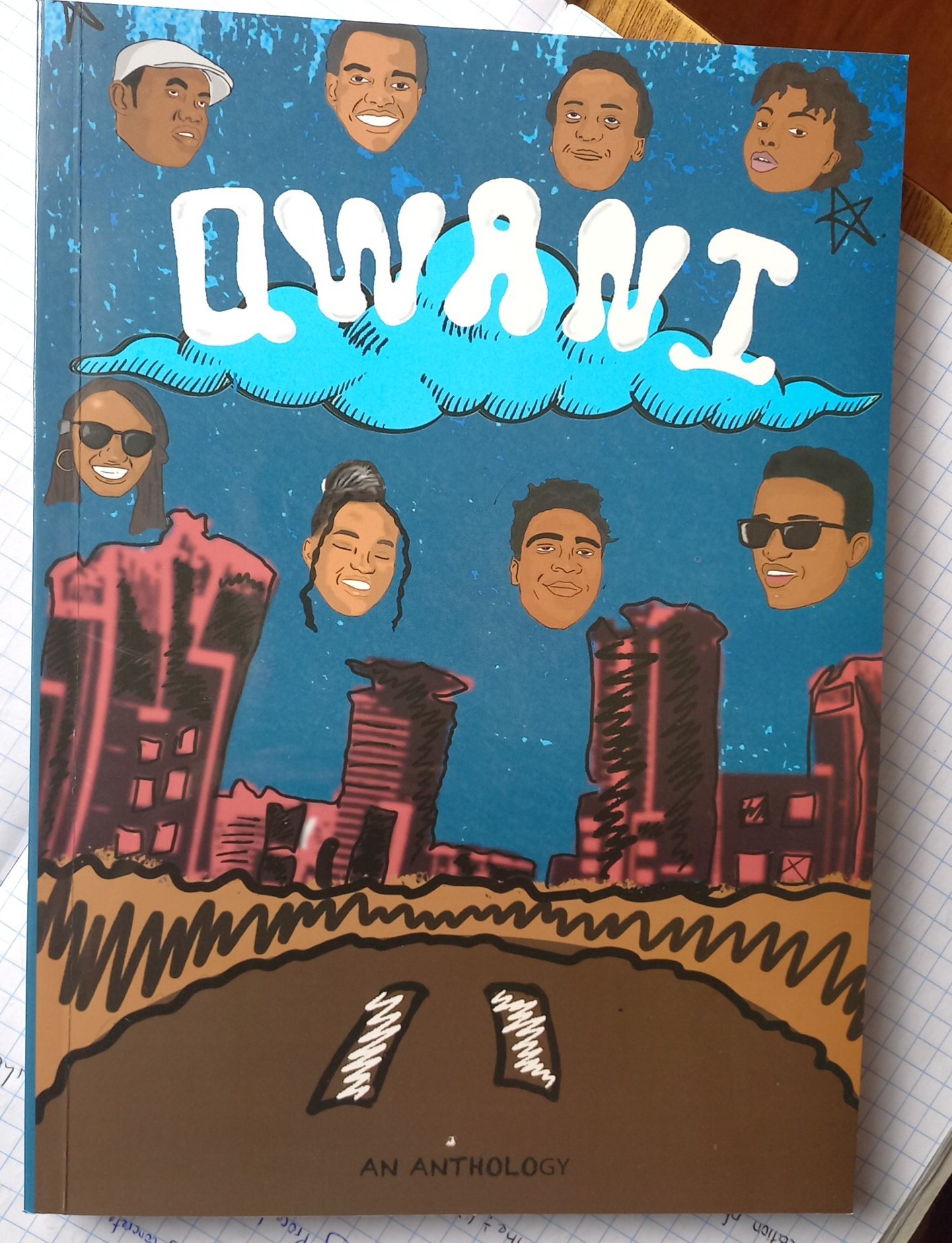Earlier this year two Writers Space Kenya members (Amanda Nechesa and Sheila Ngei) were featured in a young writers anthology , The Qwanibok anthology . WSA-K fellow member , Frank Njugi, had a sit down with them and Curated this Conversation that explores their featured stories , the Qwanibok group and the new generation of Literary creatives…..
Frank ; Hello Amanda . Hello Sheila. It is a pleasure talking to both of you !
First of all congratulations on receiving you first print publications in the Qwanibok Anthology. Can you tell me about your personal writing journeys ? What can you say drew you into Literary arts ?
Amanda ; Hello to you too Njugi. Thank you for having me and for the congratulatory message. Being in a print publication like Qwani was definitely a big rush in my veins.
On my personal writing journey what I can say is the journey and the passion has always been with me. It might sound a little bit cliche, for I feel like a lot of writers say that, but it’s true for my case. Sharing one memory from childhood there was a time, when things were not particularly good in our family, and two of my siblings and I, (the ones I follow because they’re twins), we would go to the library every Saturday without fail and just get immersed in books.
I come from a small village in Kakamega, and the library was in Kakamega town, and we would trek, through hills and valleys and the only clean water pipe at the time, to get there. We would go into the library, and for a moment, that was our heaven. And when we came out, it was like we had this little secret we could all share, the three of us. Granted that we had completely different tastes in books, we formed a bond through literature.
On my writing Journey and how it begun. Like most writers mine didn’t start to take form and shape until the upper primary school, when we would write compositions. As a child, and even now as an adult, I sometimes struggle with communicating what I really want to say, or feel, or imagine and I spent too much time building castles in my head. Those school writings were my salvation, my way of putting all these thoughts and feelings and imaginings into words.
This escape, this salvation, continued up to high school, and even when there was not an assignment, I would find myself writing stories and poems at the back of my notebooks. At the time, I felt they were the greatest things on earth, although now when I find those notebooks at home and read what I was writing, I just want to shoot myself in the head.
When I joined uni , I still continued to do this – writing in random notebooks, till I discovered WordPress! WordPress was heaven sent at the time, and I created a site for a while where I let out all my emotions. The site was called Little Nirvanas, and it was my baby. After a few years, I transferred the site to a more “serious” website, but I abandoned it because of my lack of seriousness. I abandoned my baby. Sometimes, this truth hurts me so much. I think I will go back to it one day.
Sheila ; Hello Frank ! As for me I would say I grew up to find life quite dark and was more than lucky to be drawn into the Arts. I loved reading thrilling tales as a child and was surprised to find a curiosity to pen such in 2019. It took me a few years to fully recognize and act on this curiosity but recognize I did. When writing, I discovered a chance to give the doom a shape, a presence, a name, a laugh, an ache and if I am lucky, a color and gradually my world is renewed. Logically however, I write because there is not much else I would rather spend my heart, time and mind on. The French author, Annie Ernaux revealed that she has often made love to rediscover that not even an orgasm is as pleasurable as writing a book and I agree.
Frank ; Sounds like really profound journeys you two have had. Can you tell me what inspired the stories that appear in the anthology ?
Amanda ; Personally , I had two stories published in the book. The first is “The Cat and The Man,” and the second is “My Ribs.” The former is what I have received the most praises for. Like the title suggests, the story literally tells the experience between a cat and a man. In the piece, which is told by an observer, a cat approaches a man who is sitting in the dark. The observer then tries to imagine what conversation the two beings can possibly have. Through this imagined conversation, the reader gets to see the passing thoughts of the observer. Like the language I used in it , my motif behind it is also embarrassingly simple – I was standing on the balcony one night, and I saw a cat, I saw a man, I saw the cat approaching the man and voila, the story was born.
As for the later – “My Ribs,” which I had initially titled “The MIlitary Man,” but changed it for reasons unknown to me (The Military Man, in my opinion, was a much better title), I fictionalise a real life experience where a lady meets a man in a bar. The man, who has a violence streak all about him – cracked knuckles, gun in the car, and the dangerous entitlement of someone who does not faint at the thought of blood – claims to be a military man. This happened to me in real life, and even though I did not entertain the “military” man, in the story, I form a character and she explores this for me.
Sheila ; I am a simpleton for love and thus tend to dodge it but I’d like to imagine a freer dame delusional enough to live fully. In my story , the protagonist’s would be a crooked pot of things. Lust, impatience and anger would test her while pampering, hunger and deceit court her. She would ultimately pick love, both for self and for another. Her mind would play tricks her heart walks through unharmed. Her very existence would be a horrendous act. In memo mode, I write from this woman’s point of view.
Frank ; Having read the three stories , I truly get what you two are eluding to.
How did it feel being first time Published authors?.. And something I wonder which I think I have to ask , Do you two think such Publishing opportunities are relevant in keeping young writers on their toes in regards to their writing?
Amanda ; As I have said , it was a big rush in my veins. I felt elated like I’ve never felt before, but then like most things dopamine-related, the elation faded pretty quickly and was replaced by satisfaction. This was the stamp of approval and validation I’ve been craving, and once it was there, I felt more settled in my writing journey.
Personally I would say that yes , I think young writers especially should seek out publication opportunities, if not from third parties, then from themselves. Even starting a blog can be an act of publication. As long as your words are out there, in a space where they can reach someone’s thoughts and feelings, then you should seek that space. It will keep you on your toes, because you would have made a name out there, and you would work to retain that name. In time, before you know it, you will have a career on your hands.
Sheila ; The first time publishing felt like a tap on the shoulder from the universe to keep going. I am happy about this and admire publishing houses for it. The opportunities provided on both electronic blogs and in physical books give a writer set goals in a way. A tale or verse is meant for the eyes of another and such chances give an author a small hill to climb so others may see them too through their work. However, I too believe recording of experiences is more important and one must pick their battles. In a way the small hill is optional and one could take the other route and die a pauper whose works will be published posthumously. Art will live where it exists, whether seen or unseen, like fungi, it requires a being for nurture and thus the artist is that who provides the nutrition. It may kill a man, the hunger of this and thus publishing could help tame it. Because then, it is not only on one man’s mind. Writing and publishing are means of sharing.
Frank ; Pawan Mishra says “Fueled by the need to interpret the past, to explore the present, and to imagine the future, each generation shapes the world of books.”
Do you agree with this , that each generation shapes their literature in their own way ?…Do you feel being part of this first Qwani book put you in a better position as literary Creatives to be the representative image of your generation of writers?
Amanda ; Yes I absolutely agree with this.Just like each generation shapes their own way of life, they also shape the kind of art they bring into the world, including literature. In our book Qwani, for example, the voices in it are all young people, and it can be seen clearly in the way they write, and what they write about. Their words are a reflection of how we view the world, or how we want to see the world to view us. Having my work in the collection, I feel, was an accurate representative image of the society I interact with, which is filled with young people. Mostly.
Sheila ; I do agree that each generation uniquely adds to the literary scope and widens human creativity. This is because every point in history is marked with its very own necessities, prejudices and means of elation. Writers are tasked with recording these experiences and how they shape human life.
I believe the publication showcased a good portion of Kenyan Millennial writing especially with the inclusion of non fictional essays on existential dread and musical reviews on Nyashinski and Beyoncé. Perhaps coining the title Qwani from legend Binyavanga Wainaina’s Kwani has put a spotlight on the authors featured, yet the light is not misplaced as Grace Asiro, Nicolle Wachera and Natasha Muhanji from the publication have been nominated for East Africa’s Sondeka Awards. Still, there are many more Kenyan “Gen-Z ” Writers who include fictional writer Kabubu Mutua and the rising poet, you, Frank Njugi.
Frank ; I am honoured you mention me among such amazing company Sheila . With what you have said in mind I have to ask , Do you two personally think the Qwanibok group and it’s project signifies the rise and emergence of the “Kenyan Gen-Z” writer?
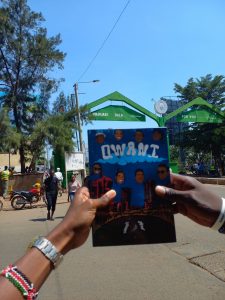
Amanda ; Yes, I think the book, at its core, signifies the emergence of Kenyan Gen-Z writers. Everyone featured in the book is young, everyone’s thoughts and feelings are young, and yet, together, they have this one collective identity that feels like the redefinition of something pre-existing. I think that redefintion is the ermegrence of Gen-Z literature, and that the Qwanibok group is among the very first publications to lead us here. I am very psyched to see where this journey will take us to be honest.
Sheila ; I believe the group’s initiative to publish their own work spoke volumes and gave a gentle alarm that Gen-Z minds are also occupied with literature. Some of the authors featured are artists in other genres such as music and spoken word performing. These bits are proof of Gen-Z’s involvement in all aspects of their age.
Frank ; If what you two attest to is true then ,What do you feel is the future of literary Publishing, with young curators emerging ? .. and what are your visions for how the Kenyan Literary scenery will be like in future?
Amanda ; i think the future of literary publishing is very bright. It feels kind of unbelievable saying that, seeing that technology is basically ruling our world. If someone who is not in the literary community reads this, they might even think I’m out of my mind. Books? Poetry? who even reads those anymore with social media at the tips of our fingertips? But people do. People still value art and literature at great lengths. And with the emergence of young curators, Gen-Z creators who choose to go deep into themselves and create something purely out of their souls despite all the distractions around , I think I can say our future is very safe.
My only hope for the scene is that it becomes something beautiful, something where everyone can write and speak their minds freely, and without fear of feeling out of place.
Sheila ; I believe with access to technology and the internet, the future is largely digital compared to print issue publishing. Many young writers begin their own blogs which in time helps them accumulate hands-on skills that ease their navigation of the literary world. I hope the future scene is more inclusive of those who lack language proficiency or have trouble reading and writing. This would involve translating books into audio texts read in different languages such as Swahili or any of the forty four ethnic languages spoken in Kenya. I believe this would better help close the gap that presents literature as an elitist art form meant only for those who do well in school. Art communicates to human beings and Gen-Z artists should anticipate overcoming age, class and language barriers.
Frank ; As we approach the end of this interview I would like to know , Who are your influences in the lit world? ..Those writers that young creatives like yourselves look up to ?
Amanda; This is going to be embarrassing, but I don’t have a lot of influences in the lit world. I should, I know I should, and that’s why I am slowly opening myself up to read more of the African lit genre and identify who I want to write like.
So far, there are only two names that come to mind when someone asks who I term as an influential writer to me, and those names are – Troy Onyango and Gloriah Amondi. I love how Troy writes, and even more so, what he has done with Lolwe. With Gloriah Amondi, I have only read about three of her pieces, but in every one of them, I have found myself. Of course, there is also Bikozulu, who we can absolutely not forget.
Sheila ; During highschool I greatly admired Margret Ogola who wrote the novel, The River and the Source. Growing up, authors were not as vital as the stories they wrote but as an adult, the line is blurred and I currently gear myself towards female authors largely due to the relatability of womanhood. I wish to present my tales as an extension of self and have found the specificity helpful.
Frank ;Finally what should we expect from you two in terms of Literary output going forward ?
Amanda ; Currently, I’m in a very creativity-charged period of my life. I want to learn everything, read everything, write everything. I am submitting to literary journals more than before, so if they do accept my pieces, as some of them already have, I expect you will be seeing my name in them.
I have also recently taken up to performing my poetry on stage. Performative poetry is not a scene I ever thought I would find myself in, but I did, and when I stepped into it, it felt like home. It feels like home. Saying that, I think you should expect to see me on stage too, rather than just read me on paper.
Sheila ; The world should expect more winding lies from me in fiction and more honesty in my poems, one of which has been shortlisted for this year’s Mystery Publishers ‘Strange Water’ themed Poetry Anthology.
Bio’s
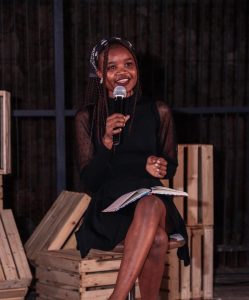 Amanda Nechesa is a writer and poet from Nairobi, Kenya. Her work has been published in Salamander Ink Magazine, WSA-K Magazine, long-listed in the Kikwetu Journal 2022 Flash Fiction contest, and some is upcoming in The Kalahari Review. Two of her short stories have also appeared in the first issue of the Qwani anthology, a collection of literature by young Kenyan writers.
Amanda Nechesa is a writer and poet from Nairobi, Kenya. Her work has been published in Salamander Ink Magazine, WSA-K Magazine, long-listed in the Kikwetu Journal 2022 Flash Fiction contest, and some is upcoming in The Kalahari Review. Two of her short stories have also appeared in the first issue of the Qwani anthology, a collection of literature by young Kenyan writers.
Amanda is a recipient of the Writers Space Africa (WSA) Online Writing Academy scholarship, where she is currently enrolled and studying Poetry, Storytelling and Creative Non-Fiction. When she is not writing, you will find Amanda meandering about, looking for a muse.
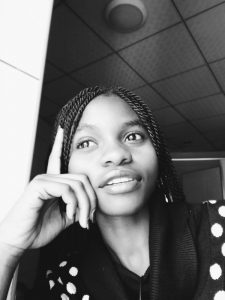 Sheila Ngei is a scribing poet, musician, and student at the University of Nairobi . Her first short story appeared on the inaugural issue of Qwani while her first poem will be published in a Mystery Publishers Poetry Anthology in late 2023.
Sheila Ngei is a scribing poet, musician, and student at the University of Nairobi . Her first short story appeared on the inaugural issue of Qwani while her first poem will be published in a Mystery Publishers Poetry Anthology in late 2023.
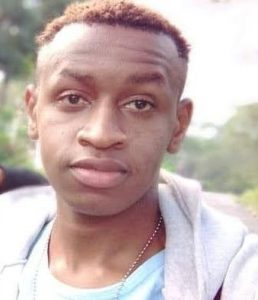 Frank Njugi is a Kenyan Writer , Page poet and Literary Culture journalist who is a member of the WSA-K ….
Frank Njugi is a Kenyan Writer , Page poet and Literary Culture journalist who is a member of the WSA-K ….

